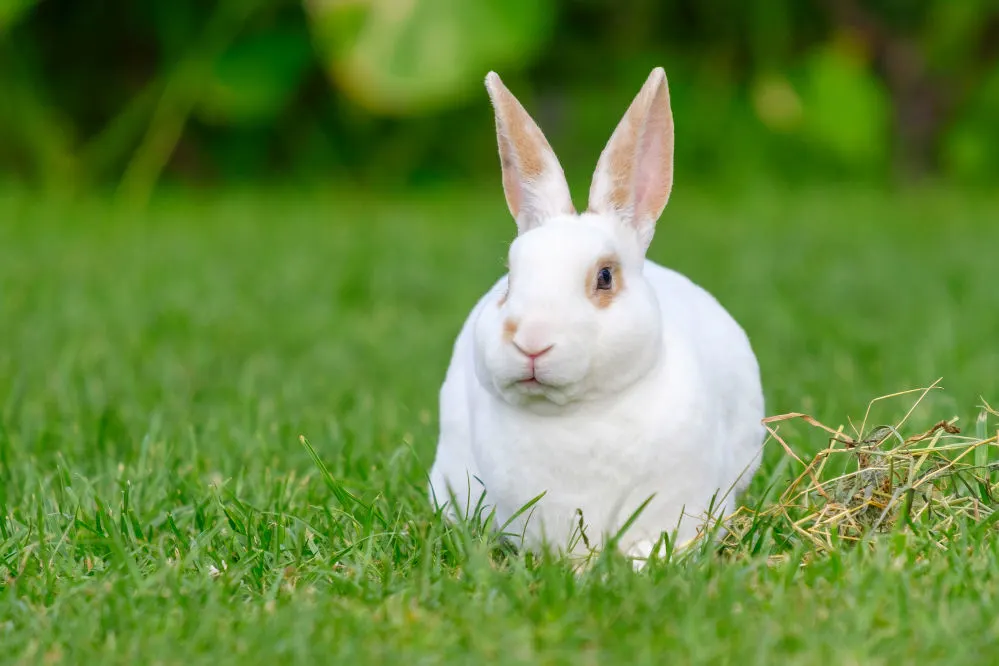It’s no secret that small pet owners love feeding their bunnies the occasional treat. However, doing so correctly can be challenging if you don’t know what your bun can and can’t eat.
If you’re in this camp of rabbit owners, you’re probably itching to find out as much as possible about suitable snacks. Hoppers have notoriously sensitive digestive systems, so you should always be cautious about feeding your pet the right foods.
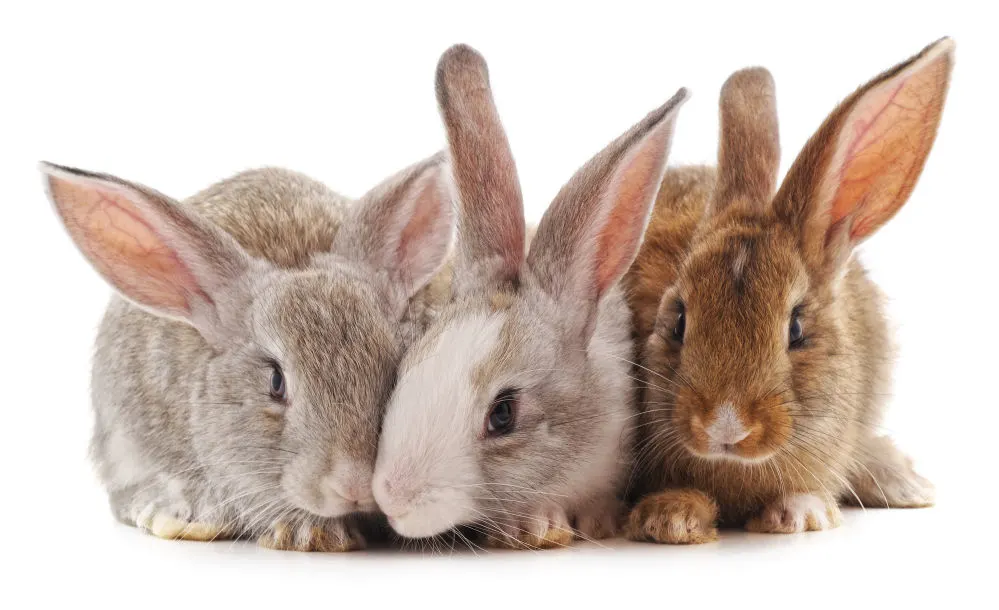
Pineapple is a delicious tropical fruit loved by humans and animals alike, but is this sweet treat safe for your rabbit to eat? Find out how pineapple affects your pet bunny and more as you read on.
Tip: You may also want to know if rabbits can have grapes.
Can rabbits eat pineapple?
The pineapple is a popular fruit eaten globally. People love it for its sweet yet tangy flavor and its properties as an antioxidant. You can find it in every supermarket year-round.
But does the fruit’s popularity make it safe for your bunny to eat? Yes, your pet rabbit can eat pineapple in small quantities.
Just take note that this tasty fruit contains a lot of sugar. While humans can cope with the extra sugar, you should be cautious of how much pineapple you give your bun.
Tip: Are you looking for more fruits to add to your bun’s diet? See here to find out if rabbits can eat strawberry tops.
Can rabbits have pineapple leaves?
Unlike some fruits, pineapple doesn’t have the most enticing exterior. You shouldn’t feed your rabbit pineapple leaves as they’re too tough and spiky to digest. They also have a bitter taste that your hopper won’t enjoy.
Even if your bunny can’t eat them, there is evidence of the antioxidant activity of bromelain in pineapple leaves. Bromelain has a lot of promising effects on inflammation and improving digestion.
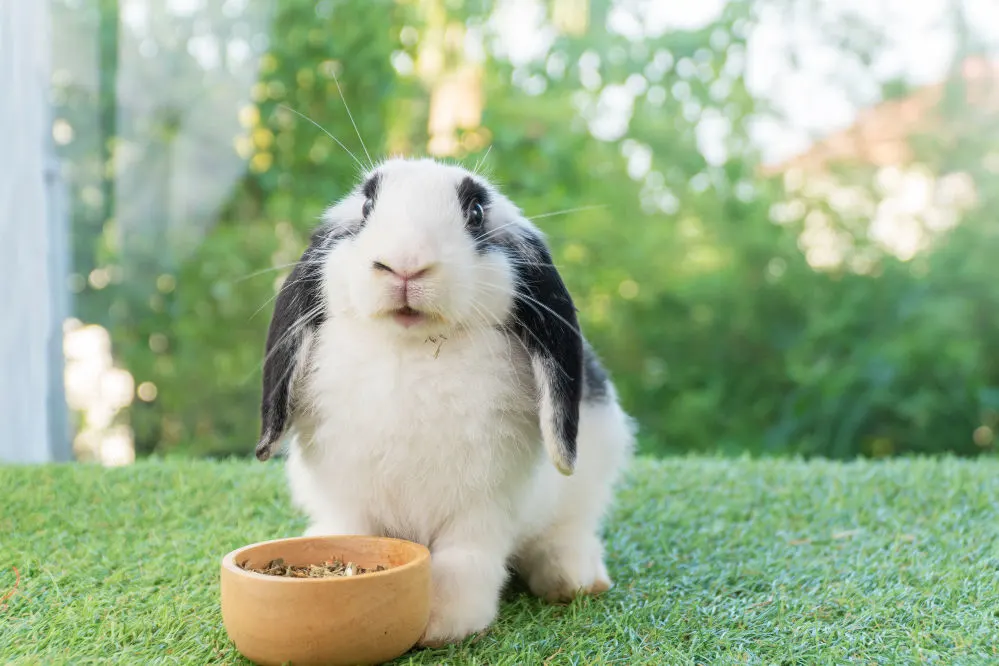
There is bromelain in all parts of the pineapple, but the highest concentration is found in the leaves. Don’t worry. You and your bun will still benefit from bromelain by eating the flesh, so you don’t need to start munching on these bitter leaves any time soon.
Can rabbits eat pineapple skin?
Like the leaves, pineapple skin is too hard on your rabbit’s digestion and mouth. Your pet rabbit will struggle to chew the hard and spiky skin, and they won’t be able to digest it fully.
The skin of the pineapple could get trapped in your rabbit’s digestive tract, which can cause several problems, including painful gas and constipation. There is also the risk of the spikes hurting your bunny’s sensitive mouth.
Tip: If your fluffball needs something to gnaw on, why not get them some chew toys?
Can rabbits have pineapple juice?
It’s not recommended that you give your fluffball pineapple juice. The natural sugar from the pineapple juice is too high for a bun’s diet.
In three ounces (85 grams) of pineapple, you’ll find 0.4 ounces (10 grams) of sugar; the juice concentrates large amounts of sugar, making it unhealthy for your bun. Don’t try to supplement pineapple juice with fresh water, either, as this may harm your rabbit’s immune system.
Additionally, pineapple juice can cause diarrhea in rabbits. Due to their nature as grazers, buns are used to less water and sugar in their diets.
Nutritional value of pineapple for bunnies
Whether you have an indoor rabbit or an outdoor one, their dietary needs don’t change. You’ll find that all adult rabbits need the same diet unless they have chronic diseases or other health issues. There are certain nutrients and vitamins your pet rabbit needs to stay happy and healthy.
Pineapple does have nutritional benefits for hoppers. This juicy fruit contains antioxidants that fight free radicals in the body, which can cause cell damage over time.
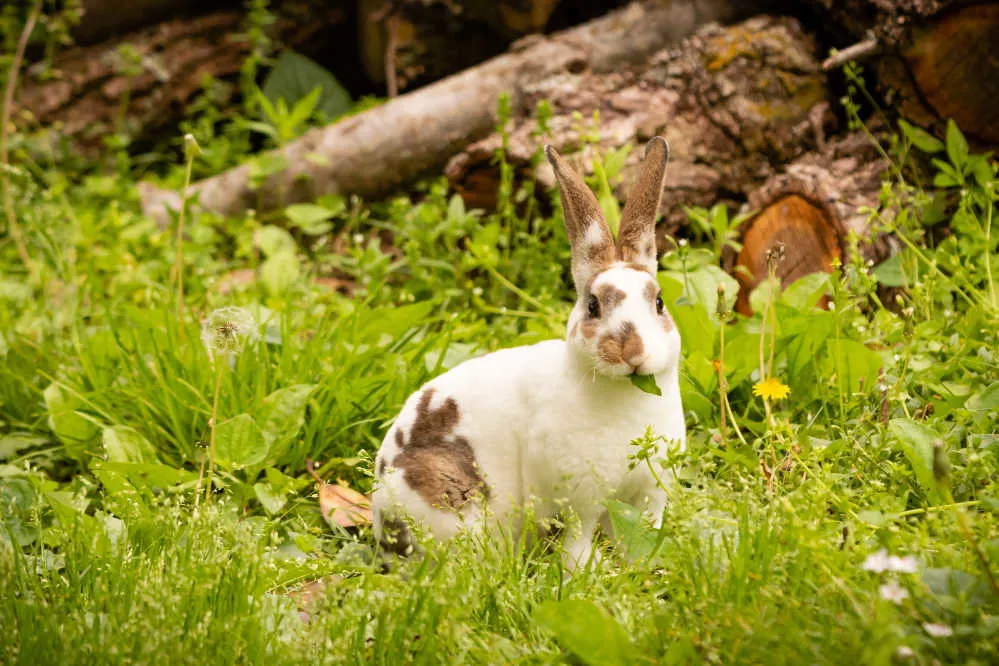
Pineapple is also a good source of essential vitamins like vitamins D, C, and B6. However, your bun-bun already makes vitamins C and B, so keep serving sizes small. Other minerals found in pineapple include manganese, magnesium, iron, and potassium, which your fluffball needs.
Can baby rabbits eat fresh pineapple?
No, you shouldn’t feed your kits any pineapple. Your baby rabbit’s digestive system cannot handle fruit until they reach at least seven months old.
You shouldn’t feed your baby rabbit fresh fruit or new food until they reach the right age. Due to their finicky digestive systems, you should introduce new foods slowly. Begin with small amounts of leafy greens like carrot tops or spinach, and move on to fruit when your bunny matures.
How to feed your rabbit pineapple
The best way to feed pineapple to your bunny is by slowly introducing it to them. Start in small amounts once a week until you know how the fruit affects your rabbit’s body.
The recommended amount of pineapple to start feeding your fluffball is about a teaspoon, or 0.15 ounces (4.2 grams). Remember that these measurements are for adult rabbits only; babies shouldn’t eat fruit until the right age.
Now you know how much pineapple to feed your bun. But how you introduce and prepare the pineapple needs a bit more detail. For more insight on how to feed pineapple to your pet, let’s take a look at the proper preparation.
Prepare the pineapple properly
Choose ripe and sweet pineapples that are neither too young nor on the verge of rotting for your bun’s snack. You will need to remove the pineapple’s skin and the leaves or crown.
Once only the flesh remains, remove the middle of the pineapple or the pineapple core. Pineapple cores are usually easy for humans to eat, but their long fibers can make your bunny choke.
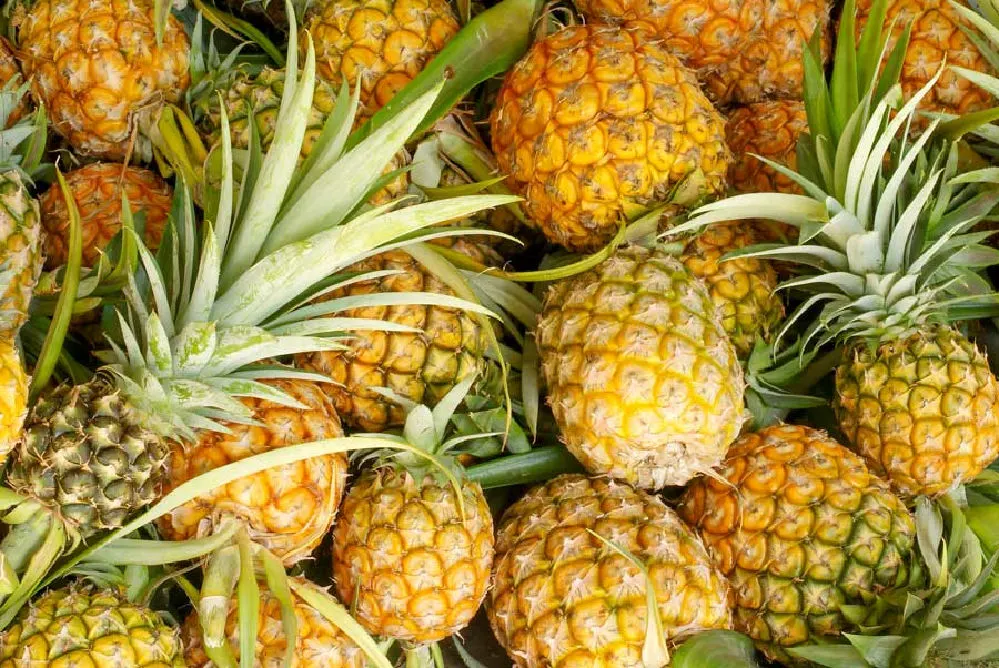
When only the edible parts of the fruit remain, cut the pineapple into small pieces. Ensure the pieces are the right size (roughly the size of a grape) so your fluffball won’t choke or overeat.
Introduce the fruit slowly
A rabbit’s digestive system can be disturbed by sudden food changes. Pineapple is a very sweet fruit, so you’ll need to introduce it in small portions. Begin with a teaspoon of pineapple, and you can increase up to a tablespoon, or 0.5 ounces (14.3 grams).
Limit the amount of the new fruit based on your rabbit’s weight. If you have a large bun, you can feed them up to a tablespoon, but small hoppers need only a teaspoon. Depending on their reaction to the fruit, you can give them pineapple once a week.
Do bunnies like pineapple?
Pet owners invested in their rabbit’s health want to know if their bun will enjoy the sweet fruits given to them. You won’t know if your hopper likes the fruit until you offer them small amounts of pineapple for the first time.
If they like the new fruit, give them the prescribed amount to avoid overeating. If they don’t like it, don’t force them to eat it and opt for healthy alternatives like apples for a special treat.
Can my bunny eat pineapple every day?
No, your fluffball shouldn’t eat pineapple every day. Your bunny shouldn’t eat fruit regularly at all. While pineapple can be a healthy snack with lots of health benefits, giving your rabbit fruit daily is a recipe for disaster. Fruit should be a treat, not a staple food.
Too much fruit can cause health issues for your bun. It’s well known that bunnies are grazers who need a high-fiber, low-sugar diet to live a healthy life.
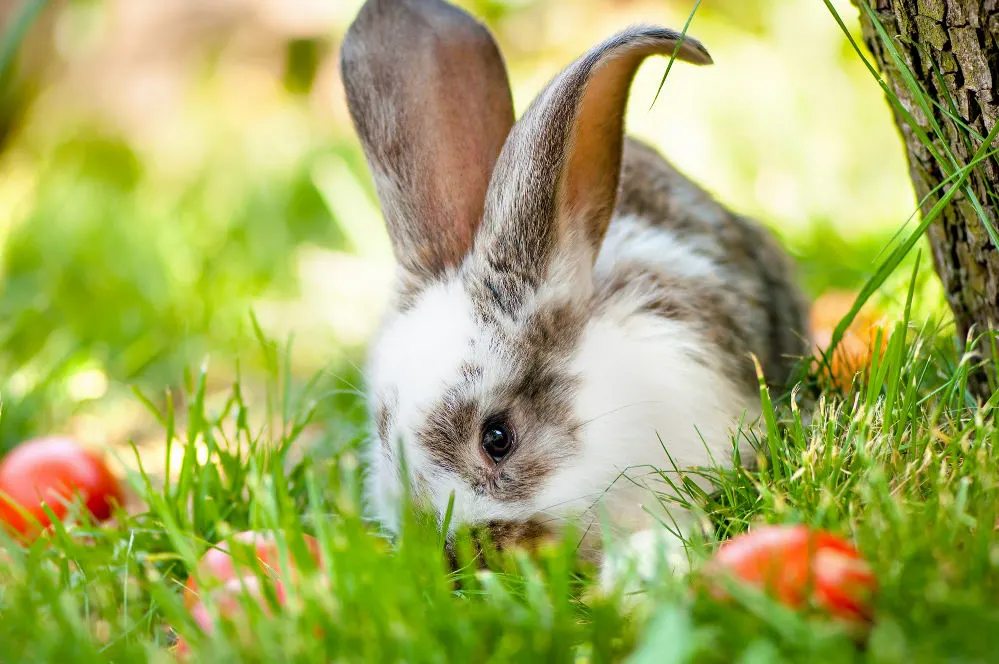
Remember that your rabbit’s diet should primarily consist of hay like timothy hay or orchard grass, for example. In addition, you can offer your pet rabbit pellets and fresh vegetables to round off their diet.
Risks of giving your rabbit too much pineapple
With the pineapple’s high sugar content, acidity, and water content, there are a few risks to overfeeding your pet the fruit. Giving adult rabbits pineapple in excess can cause several health problems.
Pineapples aren’t a subtle fruit; they’re very sweet and tangy, which can be addictive to your bunny. A sweet tooth can often lead to weight gain and obesity in rabbits. Obesity is commonly caused when you overindulge your pet in sweet foods like pineapple, which is naturally high in sugar.
There are other health problems rabbit owners should be aware of. There is a chance your rabbit could develop tooth decay, gastrointestinal stasis (GI), and mouth sores from the acidic fruit.
GI stasis can happen when your bunny’s regular diet is disrupted, and its digestive system shuts down. This is a life-threatening illness, so feed your bunny the correct diet to avoid these health issues.
Tip: If your hopper isn’t a fan of fruit, check out if your rabbit can have squash.
Feeding rabbits pineapple | Final thoughts
So, adult rabbits can eat small portions of pineapple as a healthy treat. Rabbit owners should be aware of pineapple’s high sugar content and refrain from overindulging their pets.
While giving your bun-bun what they want is fun, it’s better to focus on a balanced diet that supports your rabbit’s health.
Read next: Can rabbits have mango?
Steph Dyson is a travel journalist by trade but a lover of all small pets. She’s been a pet mum to everything from gerbils to guinea pigs, rabbits to hamsters, and fish to dogs of all shapes and sizes. She wants to share her years of experience with small pets and make Small Pet Guides the go-to website for pet owners seeking information and care advice.

